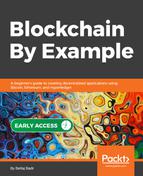We are now ready to run our network, but first we need to perform one last step—editing the compose-cli.yaml.
This file defines the networks and services including the peer, order, and cli containers, the last of which is where you issue commands that interact with the peers (creating channels, deploying Chaincode, and so on).
Below is an example of a docker-compose-cli.yaml:
version: '2'
networks: #Define blockchain network name
fscn:
#service section define all peers service and related container services:
#name of service will serve as an orderer in the fabric network
orderer.fsc.com:
extends:
file: base/docker-compose-base.yaml
service: orderer.fsc.com
container_name: orderer.fsc.com
networks:
- fscn
peer0.org1.fsc.com:
container_name: peer0.org1.fsc.com
extends:
file: base/docker-compose-base.yaml
service: peer0.org1.fsc.com
networks:
- fscn
peer1.org1.fsc.com:
container_name: peer1.org1.fsc.com
extends:
file: base/docker-compose-base.yaml
service: peer1.org1.fsc.com
networks:
- fscn
....
#client section
cli:
container_name: cli
image: hyperledger/fabric-tools
tty: true
Defining environment variable environment:
- GOPATH=/opt/gopath
- CORE_VM_ENDPOINT=unix:///host/var/run/docker.sock
- CORE_LOGGING_LEVEL=DEBUG
#- CORE_LOGGING_LEVEL=INFO
- CORE_PEER_ID=cli
- CORE_PEER_ADDRESS=peer0.org1.fsc.com:7051
- CORE_PEER_LOCALMSPID=Org1MSP
- CORE_PEER_TLS_ENABLED=true
- CORE_PEER_TLS_CERT_FILE=/opt/gopath/src/github.com/hyperledger/fabric/peer/crypto/peerOrganizations/org1.fsc.com/peers/peer0.org1.fsc.com/tls/server.crt
- CORE_PEER_TLS_KEY_FILE=/opt/gopath/src/github.com/hyperledger/fabric/peer/crypto/peerOrganizations/org1.fsc.com/peers/peer0.org1.fsc.com/tls/server.key
- CORE_PEER_TLS_ROOTCERT_FILE=/opt/gopath/src/github.com/hyperledger/fabric/peer/crypto/peerOrganizations/org1.fsc.com/peers/peer0.org1.fsc.com/tls/ca.crt
- CORE_PEER_MSPCONFIGPATH=/opt/gopath/src/github.com/hyperledger/fabric/peer/crypto/peerOrganizations/org1.fsc.com/users/[email protected]/msp
working_dir: /opt/gopath/src/github.com/hyperledger/fabric/peer
command: /bin/bash -c './scripts/script.sh ${CHANNEL_NAME} ${DELAY}; sleep $TIMEOUT'
Mapping the directories that are being used in the environment configurations:
volumes:
- /var/run/:/host/var/run/
- ./Chaincode/:/opt/gopath/src/github.com/Chaincode
- ./crypto-config:/opt/gopath/src/github.com/hyperledger/fabric/peer/crypto/
- ./scripts:/opt/gopath/src/github.com/hyperledger/fabric/peer/scripts/
- ./channel-artifacts:/opt/gopath/src/github.com/hyperledger/fabric/peer/channel-artifacts
depends_on:
- orderer.fsc.com
- peer0.org1.fsc.com
- peer1.org1.fsc.com
- peer0.org2.fsc.com
- peer1.org2.fsc.com
- peer0.org3.fsc.com
- peer1.org3.fsc.com
networks:
We define the following environment variables:
CHANNEL_NAME=$CHANNEL_NAME
TIMEOUT=$CLI_TIMEOUT
DELAY=$CLI_DELAY
The first variable, CHANNEL_NAME, holds the name of the channel that was specified earlier as an input for the configtxgen tool. For the timeout, you can provide a value (specified in seconds), otherwise the CLI container, by default, will exit after 60 seconds.
Finally, we can launch our network by calling the docker-compose command with the docker-compose-cli.yaml file, as follows:
sudo docker-compose -f docker-compose-cli.yaml up
If we run the command, it will launch our network, shown as follows:

